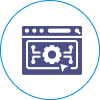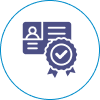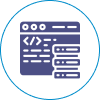Why Choose for Telemedicine Solutions?
Using Telemedicine Solutions has become essential in the ever changing healthcare landscape of
today. Compared to conventional means of delivering healthcare, these digital technologies have many benefits.
The advantages of using telemedicine solutions for healthcare providers are examined in detail below:
1. All-inclusive Patient Data Management:
Telemedicine Solutions offer a comprehensive and centralized database for managing patient data,
which includes dates of vaccinations, allergies, diagnoses, medications, treatment plans, and more. Better, more
individualized patient care can result from healthcare providers' ability to make decisions more quickly and
intelligently when all this data is in one convenient location.
2. Improved Coordination and Collaboration:
The healthcare providers may communicate and work together more easily thanks to these digital
tools. Real-time access to patient records within a healthcare facility allows various specialists and
departments to coordinate care more effectively. The total efficiency of the system is increased, redundancies
are decreased, and patient outcomes are improved by this interconnection.
3. Better Safety and Quality of Patient Care:
Telemedicine solutions greatly improve patient safety and quality of care. Features that assist
healthcare providers in seeing possible problems, avoiding prescription errors, and following evidence-based
procedures include decision support systems and alarms. This lowers the possibility of unfavorable outcomes
while guaranteeing patients receive the best care as soon as possible.
4. Effective Time Management and Workflow:
Workflow is improved by automating repetitive administrative chores like booking
appointments and completing paperwork. By spending less time on paperwork and administrative tasks,
healthcare personnel may concentrate more on providing patient care. Better time management and a more
productive work environment are the results of this increased efficiency.
5. Interoperability for Smooth Information Exchange:
One of the main components of Telemedicine Solutions is interoperability, which makes it
possible for patient data to be shared easily between different healthcare systems and facilities. This
guarantees that medical professionals, no matter where a patient receives care, have access to their
whole medical history, enabling more precise diagnosis and treatment regimens.
6. Data Security and Compliance:
In the healthcare industry, patient security and privacy protection are critical. Strong
security features like audit trails, authentication, and encryption are all included in telemedicine
solutions. By assisting healthcare professionals in adhering to industry norms and rules, these
solutions lower the possibility of data breaches and the related legal ramifications.
7. Enhanced Reporting and Analytics:
Telemedicine Solutions' sophisticated reporting and analytics features offer insightful
data on patient demographics, treatment results, and operational effectiveness. These technologies help
healthcare managers make data-driven decisions, spot trends, and put plans into action that will raise
the standard of patient care overall.
8. Customization to Meet Practice Needs:
Telemedicine Solutions can be tailored to meet specific needs, as every healthcare
practice is different. The workflow and preferences of the medical professionals utilizing these
software systems can be customized to match any size practice, be it a small clinic, medium-sized
specialty center, or large hospital.
Our Thorough Development Method for Telehealth Solutions
As a reputable healthcare software development company, we take great care to ensure that our
clients' telemedicine solutions are developed and implemented successfully. This is a synopsis of our
all-inclusive development process:
1. First Discussion and Evaluation:
We start by getting an understanding of your unique needs and goals. To find opportunities and
obstacles, our team thoroughly examines your current workflows, infrastructure, and patient demands.
2. Design of Custom Solutions:
We provide a bespoke Telemedicine Solution based on our analysis and your specific needs. This
include outlining the solution's features, functions, user interface, and integration potential.
3. Testing and Development:
Our skilled developers put forth a lot of effort to construct the Telemedicine Solution
in compliance with the authorized design guidelines. We carry out thorough testing during the
development stage to make sure the solution satisfies quality requirements and functions as intended.
4. Deployment and Integration:
We link the Telemedicine Solution with your current healthcare systems, including
practice management software and electronic health records (EHR), when development and testing are
finished. We guarantee an easy deployment with less interference with your business activities.
5. Education and Assistance:
We give your staff thorough training to guarantee a seamless transfer and successful adoption of
the Telemedicine Solution. Furthermore, our support staff is still accessible to handle any queries or problems
that might come up after deployment.
6. Ongoing Enhancement:
After deployment, our dedication to quality continues. We solicit user feedback and regularly
analyze the Telemedicine Solution's performance in order to pinpoint areas that require improvement. We
proactively carry out improvements and upgrades to make sure the solution changes to meet your demands.
The Iterative Process: Continuous Improvement
Our development methodology is rooted in continuous improvement. We actively seek feedback from
users and stakeholders, incorporating their insights into iterative updates. This ensures that your Telemedicine
Solution not only meets current needs but also evolves to address emerging challenges, reaffirming our
commitment to your success.
Examining Various Telemedicine Solution Types
Being a top provider of healthcare software development, we are experts at creating cutting-edge
telemedicine solutions that satisfy the various demands of both patients and healthcare professionals. Here's an
overview of the different kinds of Telemedicine Solutions we provide:
1. Remote Patient Monitoring (RPM):
RPM systems let medical professionals keep an eye on patients' vital signs, symptoms, and
medical records from a distance in real time. This makes it easier for patients with chronic diseases to receive
individualized care management and proactive intervention, assuring early diagnosis of any deterioration and
avoiding needless hospitalizations.
2. Virtual visits and teleconsultation:
Through video conferencing or phone calls, patients can have remote consultations with medical
specialists thanks to teleconsultation platforms. Virtual visits save wait times and require fewer in-person
appointments while offering quick access to healthcare services. For follow-up visits, expert appointments, and
non-emergency medical consultations, this kind of telemedicine solution is perfect.
3. Mobile Applications for Telemedicine:
Patients can easily access telemedicine services from their cellphones or tablets by using
mobile applications. These applications frequently offer encrypted messaging, appointment scheduling, virtual
visit features, and user-friendly interfaces that enable patients to handle their healthcare requirements at any
time and from any location.
4. Store-and-Forward Telemedicine:
This type of telemedicine entails gathering patient data, such diagnostic reports,
videos, or photos, and securely sending it to medical professionals for examination and interpretation.
For interdisciplinary collaboration, second opinions, and specialized consultations, this asynchronous
communication mechanism is especially helpful.
5. Remote Diagnostics Telemedicine Platforms:
Remote diagnostic solutions help healthcare providers understand medical images, test
results, and patient data from a distance by utilizing cutting-edge technology like artificial
intelligence (AI) and machine learning (ML). These platforms speed up treatment decisions, improve
diagnostic accuracy, and decrease turnaround times.
6. Technology for Telemedicine in Mental Health Care:
For those in need of mental health assistance, telepsychiatry and telemental health platforms
provide online counseling, treatment, and psychiatric consultations. These solutions remove geographical
boundaries, improve access to mental health services, and encourage early intervention for those who are
struggling with mental health issues.
7. Home Health Care Telemedicine Solutions:
Patients can now get medical attention, supervision, and support in the convenience of their own
homes thanks to home-based telemedicine solutions. These solutions allow people with impairments or chronic
diseases to take more autonomous care of their health. They include wearable sensors, smart home technologies,
remote monitoring devices, and telehealth visits.
8. Technically Advanced Telemedicine Products:
Additionally, we create customized Telemedicine Solutions for certain medical specialties
including pediatrics, radiology, dermatology, and cardiology. In order to ensure the best possible outcomes for
patients and clinicians, these solutions address specific clinical workflows, diagnostic criteria, and patient
care pathways.
At Bmcoder, we're dedicated to using state-of-the-art technology and our knowledge of Healthcare
Software Development Services to provide all-encompassing Telemedicine Solutions that improve patient outcomes,
change the way healthcare is delivered, and increase everyone's access to high-quality treatment.
Frequently Asked Questions
1. What are solutions for telemedicine?
Answer: Healthcare professionals can use telemedicine solutions to provide clinical services remotely using
technology. This includes mobile health apps, video consultations, and remote patient monitoring, making it
easier for patients to receive care.
2. How may patients benefit from Telemedicine Solutions?
Answer: Patients benefit from telemedicine solutions by having fewer travel requirements and shorter wait
times. They also make it simpler to see specialists and offer ongoing chronic disease monitoring, improving
overall health management.
3. What services are available through Telemedicine Solutions?
Answer: Services include mental health therapy, telepsychiatry, virtual consultations, remote patient
monitoring, chronic illness management, and remote diagnostics.
4. Are Solutions for Telemedicine Secure?
Answer: Yes, a trustworthy healthcare software development company ensures that strong security features like
authentication, encryption, and adherence to legal requirements are included in Telemedicine Solutions to
safeguard patient information.
5. Is it possible to combine telemedicine solutions with current healthcare systems?
Answer: Of course. The seamless integration of these systems with practice management software and electronic
health records (EHR) guarantees uninterrupted patient care and a smooth information flow.
6. How do Telemedicine Solutions increase the productivity of healthcare providers?
Answer: Healthcare professionals may concentrate more on patient care and less on paperwork with the help of
Telemedicine Solutions, which automate administrative duties, enable instant access to patient data, and
enable remote monitoring.
7. What technology is required to use Telemedicine Solutions?
Answer: A secure telemedicine platform offered by a provider of healthcare software development services is
required, in addition to a device with internet connection, such as a computer, tablet, or smartphone, for
both patients and providers.
8. Can all kinds of medical practices use telemedicine solutions?
Answer: It is possible to tailor Telemedicine Solutions to the requirements of different disciplines, such as
pediatrics, dermatology, cardiology, and mental health, so that all kinds of practices can take advantage of
them.
9. What is the cost of putting Telemedicine Solutions into Practice?
Answer: The complexity and features of the solution can affect the cost. A custom estimate can be obtained
from a
Healthcare Software Development Company depending on the
unique requirements and practice size.
10. How do emergency circumstances get handled by Telemedicine Solutions?
Answer: Although Telemedicine Solutions are great for non-emergency care, they also have capabilities that
can help identify and address situations quickly, such as instant access to patient records and vital sign
monitoring.
11. What is Remote Patient Monitoring (RPM) in Telemedicine?
Answer: RPM is the process of gathering and sending patient data to healthcare providers in real time using
digital devices. This makes prompt treatments and proactive management of chronic illnesses possible.
12. How can a medical professional begin using Telemedicine Solutions?
Answer: To discuss your demands, get in touch with a reputable healthcare software development company. They
will assist you in choosing, modifying, and implementing a Telemedicine Solution that is appropriate for
your practice.

































